Trầm cảm là một trong những rối loạn tâm thần phổ biến nhất. Nó có thể ảnh hưởng tới bất cứ ai, ở bất kỳ độ tuổi nào, nhưng điều gì gây ra trầm cảm ở một số người vẫn còn là điều bí ẩn. Nguyên nhân tiềm ẩn gây trầm cảm có thể bao gồm gen di truyền, tương tác hóa học trong não, các sự kiện trong cuộc sống, các bệnh lý y khoa, hoặc các yếu tố từ lối sống.
Depression is one of the most common mental disorders. It can affect anyone at almost any age, but what causes depression in some people is not always known. Potential depression causes can include genetics, brain chemistry, life events, medical conditions, and lifestyle factors.
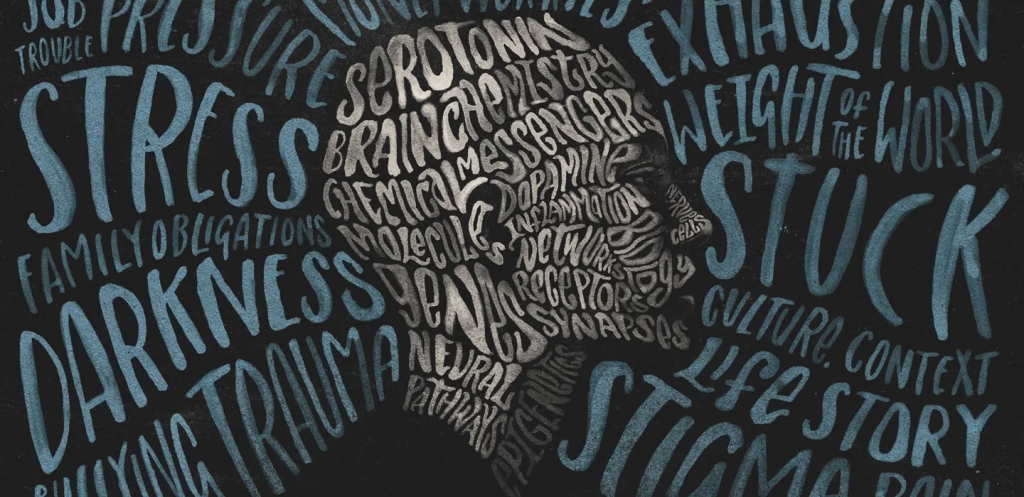
Trung tâm Kiểm Soát và Phòng ngừa Dịch Bệnh Hoa Kỳ (CDC) đã báo cáo cứ 5 người thì có khoảng 1 người Hoa Kỳ trưởng thành đã từng được chẩn đoán mắc trầm cảm trong đời. Tổ chức Y Tế Thế Giới (WHO) ước tính có 5% nam giới và 9% nữ giới mắc nhóm rối loạn trầm cảm ở bất kỳ thời điểm nào trong năm.
The Centers for Disease Control and Prevention reported that approximately 1 in 5 U.S. adults have received a depression diagnosis in their lifetime.1 The World Health Organization estimates that 5% of men and 9% of women experience depressive disorders in any given year.
Bài viết này sẽ thảo luận những nguyên nhân gây trầm cảm phổ biến. Từ các yếu tố di truyền, sinh học đến môi trường đều có thể góp phần gây ra bệnh lý này.
This article discusses common causes of depression. It covers the genetic, biological, and environmental factors that can play a role in the condition.
Nguyên nhân gây trầm cảm phổ biến. Common Causes of Depression
Các nhà nghiên cứu nghi ngờ rằng thực tế có nhiều nguyên nhân khác nhau gây trầm cảm và không phải lúc nào cũng phòng ngừa được. Các yếu tố có thể góp phần gây trầm cảm bao gồm:
Researchers suspect there are actually many different causes of depression and that it is not always preventable. Factors that can contribute to depression include:
– Gen di truyền. Genetics
– Tương tác hóa học trong não. Brain chemistry
– Một số bệnh lý y khoa nhất định. Certain medical conditions
– Sử dụng chất. Substance use
– Căng thẳng. Stress
– Dinh dưỡng kém. Poor nutrition
Trầm cảm không có một nguyên nhân đơn lẻ. Có nhiều yếu tố góp phần làm tăng nguy cơ một người sẽ xuất hiện bệnh lý này. Tỷ lệ phụ nữ mắc trầm cảm cao hơn nam giới (10.5% nữ và 6.2% nam), và chuyên gia cho rằng điều này có thể là do các yếu tố hormone.
Depression does not have a single cause. There are many factors that play a role in increasing the risk that a person will develop the condition. Women experience depression at higher rates than men (10.5% of women vs. 6.2% of men),2 which experts suggest may be due to hormonal factors.
Tiền sử gia đình và di truyền. Family History and Genetics
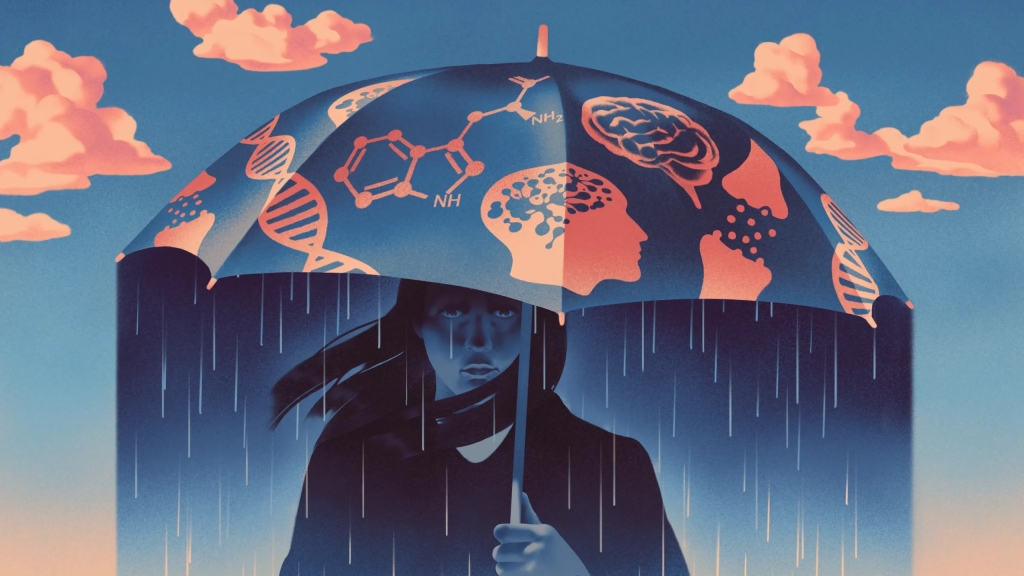
Tiền sử gia đình có người mắc trầm cảm sẽ làm tăng nguy cơ bạn cũng sẽ mắc bệnh lý này. Bạn sẽ dễ xuất hiện các triệu chứng trầm cảm hơn nếu có ai đó trong gia đình mắc trầm cảm hoặc bất kỳ một rối loạn khí sắc nào khác. Ước tính cho thấy trầm cảm bị tác động khoảng 40% từ di truyền.
A family history of depression may increase your risk of developing the condition. You are more likely to experience symptoms of depression if others in your family also have depression or another type of mood disorder. Estimates suggest that depression is approximately 40% determined by genetics.3
Nghiên cứu về các cặp song sinh, con nhận nuôi và gia đình cho thấy trầm cảm và di truyền có liên hệ với nhau. Mặc cấu phần di truyền góp phần rất lớn, nhưng các nhà nghiên cứu vẫn chưa nắm rõ về tất cả các yếu tố nguy cơ từ gen di truyền gây trầm cảm.
Twin, adoption, and family studies have linked depression to genetics. While studies suggest that there is a strong genetic component, researchers are not yet certain about all the genetic risk factors for depression.4
Nghiên cứu cho thấy việc có cha mẹ hoặc ông bà mắc trầm cảm sẽ làm bạn tăng nguy cơ mắc bệnh lý này gấp hai lần.
Studies show that having a parent and grandparent with depression doubles the risk of having the condition.5
Hiện vẫn chưa rõ chính xác loại gen nào góp phần gây trầm cảm, nhưng các nhà nghiên cứu biết rõ rằng có nhiều gen khác nhau có thể góp phần. Bằng cách hiểu rõ hơn quá trình vận hành của chúng, các nhà nghiên cứu về di truyền có thể tạo ra nhiều hình thức điều trị hiệu quả hơn.
It is still unclear exactly which genes play a role in depression, but researchers do know that there are many different genes that can play a role. By better understanding how they function, gene researchers hope to be able to create more effective treatments.
Ta cũng cần nhớ rằng không có một nguyên nhân đơn lẻ nào có thể độc lập gây trầm cảm. Di truyền có thể làm tăng nguy cơ mắc và môi trường có thể tác động vào và xác định mức độ nguy cơ bạn sẽ mắc trầm cảm.
It is important to remember that no single cause of depression acts in isolation. Genetics may increase your risk and environmental influences may then determine how likely you are to develop depression.
Nguyên nhân từ não bộ và cơ thể. Brain and Body Causes of Depression
Một số nguyên nhân gây trầm cảm có liên đới tới não bộ và cơ thể. Những yếu tố này có thể làm tăng nguy cơ mắc trầm cảm.
Some causes of depression are related to the brain and body. These can raise your risk for depression.
Mất cân bằng các chất hóa học trong não. Brain Chemistry Imbalances
Một nguyên nhân sinh học tiềm ẩn gây trầm cảm là mất cân bằng các chất dẫn truyền thần kinh liên quan đến điều tiết tâm trạng. Một số chất dẫn truyền thần kinh nhất định, bao gồm dopamine, serotonin và norepinephrine, đều đóng một vài trò quan trọng trong điều tiết tâm trạng.
One potential biological cause of depression is an imbalance in the neurotransmitters which are involved in mood regulation.5 Certain neurotransmitters, including dopamine, serotonin, and norepinephrine, play an important role in mood.
Các chất dẫn truyền thần kinh là các chất hóa học hỗ trợ nhiều bộ phận khác nhau trong não giao tiếp với nhau. Khi một số chất dẫn truyền thần kinh bị thiếu hụt có thể làm xuất hiện một số triệu chứng được nhận diện là trầm cảm lâm sàng.
Neurotransmitters are chemical substances that help different areas of the brain communicate with each other. When certain neurotransmitters are in short supply, it may lead to the symptoms we recognize as clinical depression.
Theo thuyết này, có quá nhiều hay quá ít một số chất dẫn truyền thần kinh nhất định có thể gây, hoặc ít nhất là góp phần gây trầm cảm.
This theory of depression suggests that having too much or too little of certain neurotransmitters causes, or at least contributes to, depression.
Mặc dù cách giải thích này thường được coi là nguyên nhân chủ yếu gây trầm cảm, nhưng vẫn chưa được kiểm chứng và nhiều chuyên gia vẫn tin rằng nó không thể hiện bức tranh đầy đủ các yếu tố phức tạp góp phần gây nên bệnh lý này.
While this explanation is often cited as a major cause of depression, it remains unproven and many experts believe that it doesn’t paint a complete picture of the complex factors that contribute to the condition.
Thuốc điều trị trầm cảm thường tập trung vào thay đổi nồng độ một số chất hóa học nhất định trong não. Một số lựa chọn điều trị bao gồm thuốc ức chế tái hấp thu có chọn lọc serotonin (SSRI), thuốc ức chế tái hấp thu serotonin-norepinephrine (SNRI), thuốc ức chế monoamine oxidase (MAOI) và thuốc chống trầm cảm ba vòng (TCA).
Medications to treat depression often focus on altering the levels of certain chemicals in the brain. Some of these treatments include selective serotonin reuptake inhibitors (SSRIs), serotonin-norepinephrine reuptake inhibitors (SNRIs), monoamine oxidase inhibitors (MAOIs), and tricyclic antidepressants (TCAs).
Sức khỏe thể chất và một số bệnh lý y khoa nhất định. Physical Health and Certain Medical Conditions
Bạn có thể dễ xuất hiện triệu chứng trầm cảm hơn nếu bạn có mắc một bệnh lý mãn tính, rối loạn giấc ngủ, hoặc bệnh lý về tuyến giáp. Tỷ lệ trầm cảm cũng thường cao hơn ở những người bị đau mãn tính, tiểu đường, bệnh đa xơ cứng, và ung thư.
You may be more likely to experience symptoms of depression if you have a chronic illness, sleep disorder, or thyroid condition. Depression rates also tend to be higher among people who have chronic pain, diabetes, multiple sclerosis, and cancer.4

Tâm trí và cơ thể có liên hệ với nhau. Nếu bạn gặp vấn đề sức khỏe thể chất, thì bạn có thể cũng xuất hiện những thay đổi trong sức khỏe tinh thần.
The mind and the body are linked. If you are experiencing a physical health problem, you may discover changes in your mental health as well.
Bệnh tật tương quan với trầm cảm theo hai cách. Căng thẳng từ việc mắc bệnh mãn tính có thể châm ngòi cho một đợt trầm cảm điển hình. Ngoài ra, một số bệnh lý nhất định, như rối loạn tuyến giáp, bệnh Addison, và bệnh gan, có thể gây ra các triệu chứng trầm cảm.
Illness is related to depression in two ways. The stress of having a chronic illness may trigger an episode of major depression. In addition, certain illnesses, such as thyroid disorders, Addison’s disease, and liver disease, can cause depression symptoms.6
Hormone sinh dục nữ. Female Sex Hormones
Đã có nhiều tài liệu chứng minh phụ nữ mắc trầm cảm điển hình cao hơn gấp hai lần so với nam giới. Vì sự xuất hiện của rối loạn trầm cảm tập trung nhiều nhất trong những năm thuộc độ tuổi sinh sản của nữ giới, nên người ta tin rằng yếu tố nguy cơ về hormone có thể góp phần.
It has been widely documented that women experience major depression about twice as often as men. Because of the incidence of depressive disorders peaks during women’s reproductive years, it is believed that hormonal risk factors may be at play.3
Phụ nữ đặc biệt dễ mắc rối loạn trầm cảm trong những khoảng thời gian hormone biến động liên tục, như quanh khoảng thời gian hành kinh, mang thai, sinh con và tiền mãn kinh. Nguy cơ mắc trầm cảm giảm đi sau thời gian mãn kinh.
Women are especially prone to depressive disorders during times when their hormones are in flux, such as around the time of their menstrual period, pregnancy, childbirth, and perimenopause. The risk of depression declines after menopause.
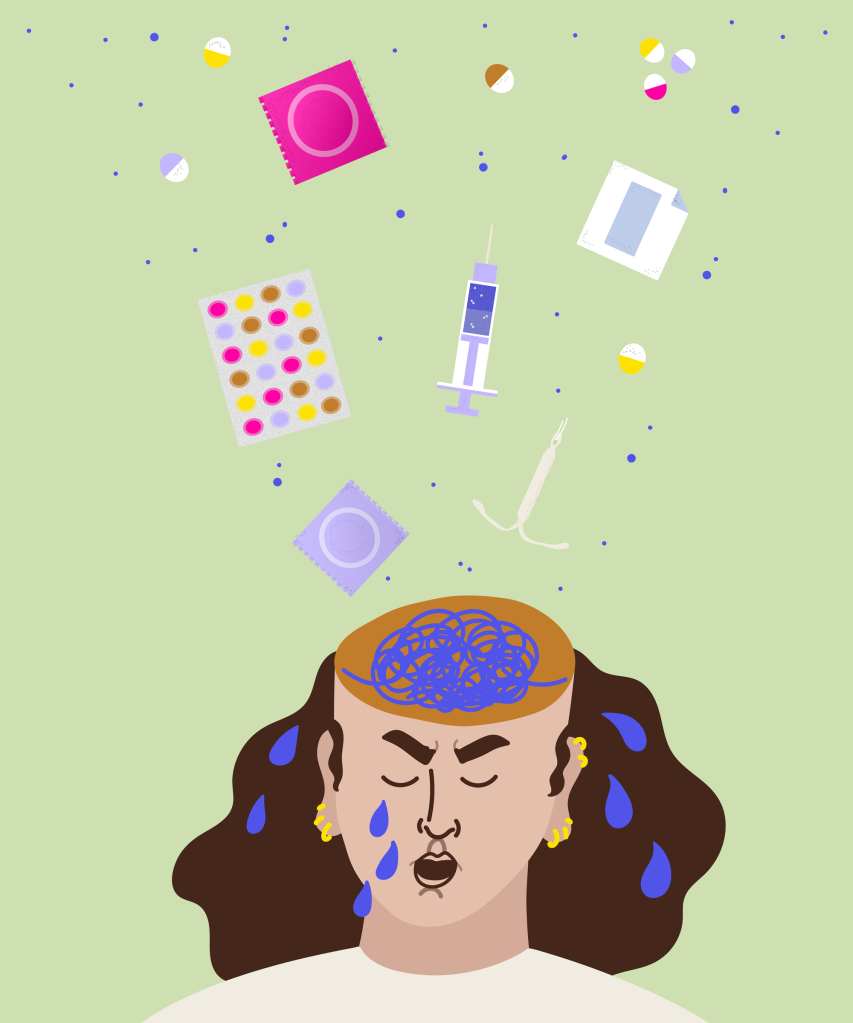
Biến động hormone gây ra bởi quá trình sinh con và bệnh lý tuyến giáp có thể góp phần gây trầm cảm. Trầm cảm sau sinh có thể xuất hiện sau khi sinh con và được cho là kết quả của hormone thay đổi nhanh chóng xuất hiện ngay sau khi sinh con.
Hormone fluctuations caused by childbirth and thyroid conditions can also contribute to depression. Postpartum depression may occur after childbirth and is believed to result from the rapid hormonal changes that take place immediately after giving birth.
Nguyên nhân về lối sống. Lifestyle Causes of Depression
Có nhiều yếu tố lối sống có thể góp phần gây trầm cảm. Mặc dù có nhiều yếu tố nguy cơ gây trầm cảm như giới tính và tiền sử gia đình vốn không thể thay đổi, nhưng con người ta thực sự có nhiều quyền kiểm soát hơn đối với lối sống của bản thân.
There are also a number of lifestyle factors that can play a role in causing depression. While many of the risk factors for depression, such as sex or family history, cannot be changed, people have much more control over lifestyle factors.
Rối loạn nhịp sinh học. Circadian Rhythm Disturbances
Một dạng trầm cảm, gọi là rối cảm cảm xúc theo mùa (có tên gọi chính thức là trầm cảm điển hình theo mùa) được tin là gây ra bởi sự rối loạn trong nhịp sinh học của cơ thể.
One type of depression, called seasonal affective disorder (officially known as major depressive disorder with seasonal pattern) is believed to be caused by a disturbance in the normal circadian rhythm of the body.7
Ánh sáng đi vào mắt sẽ ảnh hưởng lên nhịp sinh học này. Trong suốt những ngày mùa đông ngắn, khi con người ta dành thời gian ở ngoài trời hạn chế, thì nhịp sinh học này có thể bị phá vỡ.
Light entering the eye influences this rhythm. During the shorter days of winter, when people may spend limited time outdoors, this rhythm may become disrupted.
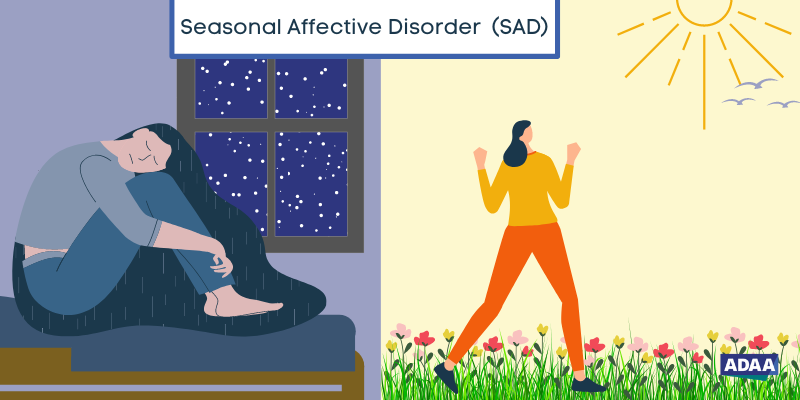
Người sống ở những vùng khí hậu lạnh nơi có nhiều ngày ngắn đêm dài sẽ có nguy cơ mắc cao nhất.
People who reside in colder climates where there are short, dark days may be at the highest risk.
Ngoài sự gián đoạn lên nhịp sinh học, giảm bớt ánh sáng tự nhiên có thể dẫn đến sụt giảm nồng độ serotonin trong não, có thể ảnh hưởng lên tâm trạng. Mùa thay đổi có thể làm thay đổi lượng melatonin trong cơ thể, làm gián đoạn giấc ngủ và góp phần thay đổi tâm trạng.
In addition to disruptions in circadian rhythm, reduced sunlight can also lead to a drop in serotonin levels in the brain, which may influence mood. Seasonal changes can also alter melatonin levels in the body, which can disrupt sleep and contribute to mood changes.
Mặc dù bạn không thể kiểm soát sự thay đổi các mùa, nhưng bạn có thể từng bước hạn chế ảnh hưởng của những thay đổi này lên sức khỏe tinh thần của mình. Trị liệu ánh sáng, dành thời gian ở ngoài trời nhiều hơn, chế độ ăn lành mạnh, và tập thể dục thường xuyên có thể giúp bạn chống lại trầm cảm theo mùa.
While you cannot control seasonal shifts, there are steps you can take to minimize the effect these changes have on your mental health. Light therapy, spending more time outdoors, eating a healthy diet, and exercising regularly may help combat seasonal depression.
Dinh dưỡng kém. Poor Nutrition

Một chế độ ăn kém có thể góp phần gây trầm cảm bằng nhiều cách. Thiếu hụt nhiều loại vitamin và khoáng chất được cho là gây nên các triệu chứng trầm cảm. Ngoài ra, chế độ ăn có hàm lượng đường cao cũng có liên đới với trầm cảm.
A poor diet can contribute to depression in several ways. A variety of vitamin and mineral deficiencies are known to cause symptoms of depression. In addition, diets high in sugar have been associated with depression.8
Một số nghiên cứu đã phát hiện ra rằng chế độ ăn có hàm lượng chất acid béo omega-3 thấp hoặc tỷ lệ omega-6 và omega-3 mất cân đối cũng có liên đới làm tăng tỷ lệ mắc trầm cảm.
Some studies have found that diets either low in omega-3 fatty acids or with an imbalanced ratio of omega-6 to omega-3 fats are associated with increased rates of depression.9
Căng thẳng. Stress
Các sự kiện gây căng thẳng trong cuộc sống, vốn khiến một người rất khó đương đầu, cũng có thể là một nguyên nhân gây trầm cảm. Các nhà nghiên cứu nghi ngờ nồng độ hormone cortisol cao, được giải phóng trong các giai đoạn căng thẳng, có thể ảnh hưởng lên chất dẫn truyền thần kinh serotonin và góp phần gây trầm cảm.
Stressful life events, which overwhelm a person’s ability to cope, can also be a cause of depression.7 Researchers suspect high levels of the hormone cortisol, which are secreted during periods of stress, may affect the neurotransmitter serotonin and contribute to depression.
Đau buồn và mất mát. Grief and Loss
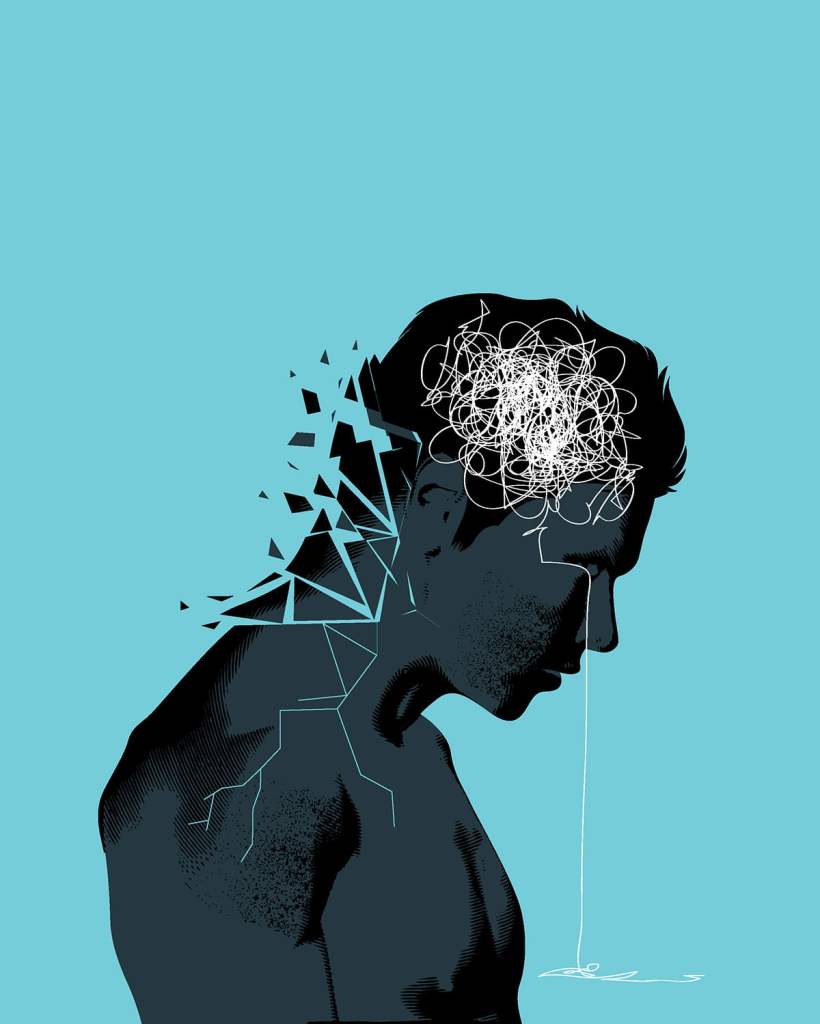
Sau khi người thân ra đi, người ở lại thường trải qua rất nhiều triệu chứng trầm cảm. Khó ngủ, chán ăn, và mất đi hứng thú hay quan tâm đến đến các hoạt động thường nhật là phản ứng bình thường trước một nỗi mất mát.
Following the loss of a loved one, people who are grieving experience many of the same symptoms of depression. Trouble sleeping, poor appetite, and a loss of pleasure or interest in activities are a normal response to loss.10
Các triệu chứng đau buồn thường giảm dần theo thời gian. Nhưng khi các triệu chứng ngày càng trở nặng thì nỗi đau buồn có thể biến thành trầm cảm.
The symptoms of grief are expected to subside over time. But when symptoms get worse, grief may turn into depression.
Sử dụng chất. Substance Use
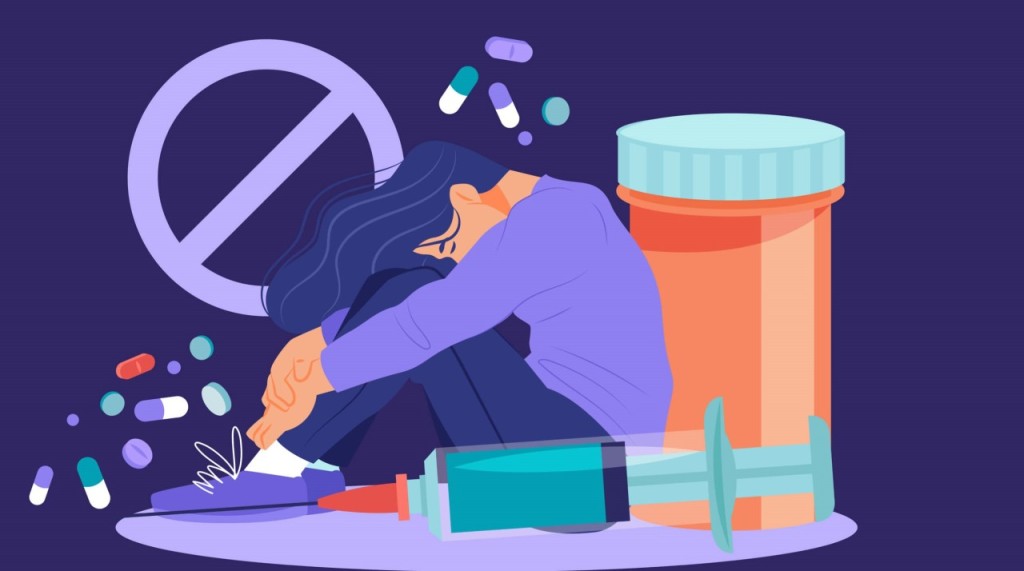
Sử dụng ma túy và chất có cồn có thể góp phần gây ra nhóm rối loạn trầm cảm. Nhưng ngay cả các thuốc kê toa cũng có liên đới với trầm cảm.
Drug and alcohol use can contribute to depressive disorders.6 But even some prescription drugs have been linked to depression.
Một số thuốc được phát hiện có liên đới với trầm cảm bao gồm thuốc chống co giật, thuốc hạ mỡ máu statin, chất kích thích, benzodiazepine, corticosteroid, và thuốc chặn beta. Cần cẩn trọng xem xét các thuốc bạn được bác sĩ kê toa và trao đổi với bác sĩ nếu bạn cảm thấy bị trầm cảm.
Some drugs that have been found to be associated with depression include anticonvulsants, statins, stimulants, benzodiazepines, corticosteroids, and beta-blockers.11 It’s important to review any medications that you’ve been prescribed and to speak with your physician if you are feeling depressed.
Tham khảo. Sources
Centers for Disease Control and Prevention. National, State-Level, and County-Level Prevalence Estimates of Adults Aged ≥18 Years Self-Reporting a Lifetime Diagnosis of Depression — United States, 2020.
National Institute of Mental Health. Major depression.
Lohoff FW. Overview of the genetics of major depressive disorder. Curr Psychiatry Rep. 2010;12(6):539-546. doi:10.1007/s11920-010-0150-6
National Institute of Mental Health. Chronic illness & mental health.
Weissman MM, Berry OO, Warner V. A 30-year study of 3 generations at high risk and low risk for depression. JAMA Psychiatry. 2016;73(9):970-977. doi:10.1001/jamapsychiatry.2016.1586
Ng E, Browne CJ, Samsom JN, Wong AHC. Depression and substance use comorbidity: What we have learned from animal studies. Am J Drug Alcohol Abuse. 2017;43(4):456-474. doi:10.1080/00952990.2016.1183020
Yang L, Zhao Y, Wang Y, et al. The effects of psychological stress on depression. Curr Neuropharmacol. 2015;13(4):494-504. doi:10.2174/1570159×1304150831150507
Knüppel A, Shipley MJ, Llewellyn CH, Brunner EJ. Sugar intake from sweet food and beverages, common mental disorder and depression: Prospective findings from the Whitehall II study. Sci Rep. 2017;7(1):6287. doi:10.1038/s41598-017-05649-7
Larrieu T, Layé S. Food for mood: Relevance of nutritional omega-3 fatty acids for depression and anxiety. Front Physiol. 2018;9:1047. doi:10.3389/fphys.2018.01047
Zisook S, Shear K. Grief and bereavement: What psychiatrists need to know. World Psychiatry. 2009;8(2):67-74. doi:10.1002/j.2051-5545.2009.tb00217.x
Qato, DM, Ozenberger, K, Olfson, M. Prevalence of prescription medications with depression as a potential adverse effect among adults in the United States. JAMA. 2018;319(22):2289-2298. doi:10.1001/jama.2018.6741
Nguồn: https://www.verywellmind.com/common-causes-of-depression-1066772
Như Trang.
